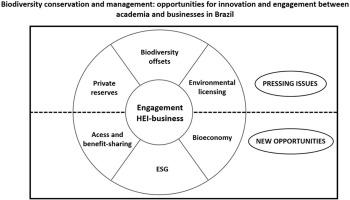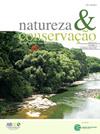Official reports and academic studies call for profound and immediate transformations in how businesses relate to biodiversity. The urgency is such that the first draft of the Post-2020 Global Biodiversity Framework (GBF) of the Convention of Biological Diversity has a specific target aimed at full sustainability in biodiversity practices in businesses by 2030. Brazil—a country with the greatest reservoir of biodiversity and the 12th largest economy on the planet —should be fertile ground for new developments and innovations on this front. However, the shortage of academic engagement with businesses in the country may impede this path. We propose six biodiversity-related innovation fronts and opportunities for engagement between high education institutions and companies in Brazil. We reviewed the literature regarding two sets of practices: pressing issues (including environmental licensing, biodiversity offsets, and conservation in private reserves), and new business opportunities (sustainable bioeconomy, access and benefit sharing – ABS, and environmental and social governance – ESG). Such themes have direct relevance to the Post-2020 GBF business sustainability target and potential national impact. There is plenty of room for academic engagement with businesses in all cases. Examples include supporting definition of metrics and standards, providing information systems to increase transparency, among others. In conclusion, we argue that an innovative mindset from corporations and academics will be necessary before Brazilian businesses can move on to develop innovative and sustainable processes and products related to biodiversity.



